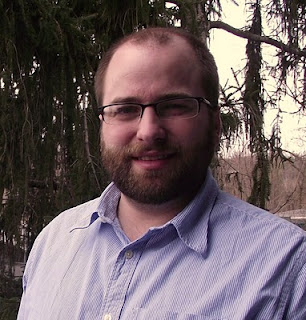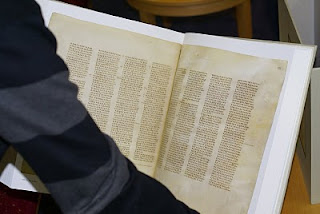In spite of catching a terrible cold just before this meeting, which means a lot of sneezing and coughing, I am otherwise really enjoying the
Seventh Birmingham Colloquium, as usual very well-organized by Hugh Houghton, David Parker and others, with good papers, discussions and, above all, good company including old friends and new acquintances.
Today there were several good papers and I hope that my own presentation on Mark 1:1 with some emphasis on the patristic evidence counts among them.
Jeff Kloha presented on "The NT Text of Nicetas of Remesiana (with special reference to Luke 1:46)" and it turned out that Nicetas attributes the magnificat to Elisabeth instead of Mary in Luke 1:46 (Jeff referred to it as a piece of "unorthodox corruption") – a tradition otherwise reflected in some VL MSS (3 4 11). Kloha identified a textual connection with 3, 4, 11 and 14 in several other passages, e.g., Luke 10:42; John 5:29; 14:13. Kloha suggested that the rather peculiar reading reading "Elisabeth" in Luke 1:46 may reflect a stream of the Greek tradition.
The next paper was offered by Claire Clivaz, "The Same Words, but not the Same Readings: Early Christian Readings of Lk 22,43-44." Clivaz opened by stating that after writing 640 pages on this passage (in her published dissertation) she still is confident that new early readings of the passage (=interpretations of the text rather than variant readings) could be discovered. The paper focused mainly on the ambivalence of the noun ἀγωνία from the second century CE onwards, as well as the association of struggle and sweat in a religious context.
In my own presentation on the textcritical problem in Mark 1:1, whether the phrase ‘Son of God’ was accidentally omitted from an original or added by some scribe(s), I focused in particular on the patristic evidence (given the theme of the conference), and attempted to demonstrate the marked tendency on the part of some fathers to abbreviate the text. Moreover, I argued for the plausibility of an accidental omission, even in the opening of a book, in the light of observable scribal habits in the extant tradition. Unfortunately, Peter Head, who has written an article defending the short version, wasn't here to argue with me :-(, but another co-blogger from Tyndale House, Dirk Jongkind, stepped in and posed a good question about the correction in Sinaiticus in Mark 1:1 and other corrections in this Gospel, and whether they can be shown to have been made from another exemplar or not.
Gary Pence offered the next paper on the "Citations of St. John's Gospel in the Writings of Basil of Caesarea" which was basically a good demonstration of the lack of good critical editions of Basil's various work which are necessar preconditions for further work of evaluating the patristic citations.
As the cream on the cappuchino, Ulrich Schmid offered a very stimulating paper on "Marcion and the Textual History of Romans: Early Editions of New Testament Writings and Corpora". It was so interesting that I did not at all mind that he went slightly over the alotted time, and for me personally I would have loved to here more. But, then there was time for lunch and the afternoon excursion to Lichfield Cathedral. More on that later perhaps.
 In the picture: Ulrich Schmid and Rachel Kevern (presiding)
In the picture: Ulrich Schmid and Rachel Kevern (presiding)I took more extensive notes during Schmid's presentation, which I may publish in a separate post. However, Schmid posed three basic challenges relating to his subject – Marcion and the textual history of Romans:
1. How can we reconstruct Marcion’s text?
2. Marcion’s heavy theological agenda may have interferred with other (previous) editorial activity. So how can we tell who has edited what, and when, and for what purposes?
3. What is the appropriate reference point for interpreting editorial variation? We must remember that we cannot deal with individual writings and neglect that they have been transmitted in collections, and a collection is itself an editorial activity. At least one person (the collector) has affected the book in terms of editorial activity.
Schmid then went on to elaborate on this challenges and offer some preliminary answers. I will return to that in another post. However, the very quick answer to the first challenge, of course, is to read Schmid's 1995 monograph,
Marcion und sein Apostolos: Rekonstruktion und historische Einordnung der marcionitischen Paulus-Briefausgabe (Arbeiten zur neutestamentlichen Textforschung 25; Berlin: De Gruyter, 1995). This fine treatment of Marcion's text of the
Apostolos (in Marcion's case the Pauline Epistles) has unfortunately often been overlooked in scholarly discussions. It certainly deserves more promotion.
 The title ‘Changes to the Bible through the ages are being studied by New Orleans scholars’ was a bit unfortunate, but the Center for New Testament Textual Criticism at New Orleans Baptist Theological Seminary was featured in a major newspaper article.
The title ‘Changes to the Bible through the ages are being studied by New Orleans scholars’ was a bit unfortunate, but the Center for New Testament Textual Criticism at New Orleans Baptist Theological Seminary was featured in a major newspaper article.






